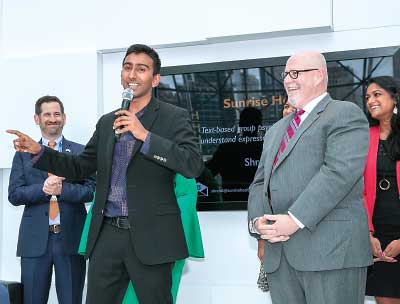Innovation Lab Winner Looks to Build Robust Online Support Community
Abstract
Sunrise Health is an online app for anonymous but well-regulated support groups in which individuals can share freely without fear of trolling or misinformation.
While moonlighting as an emergency medical technician, Shrenik Jain witnessed the devastating consequences of untreated mental illness through the people he helped after suicide attempts, drug overdoses, and other medical crises. Yet what affected him most was seeing one of his fellow first responders develop posttraumatic stress disorder but avoid getting help due to social stigma.

Shrenik Jain addresses the audience after winning the Innovation Lab Grand Prize for an app called Sunrise Health developed by him and a colleague.
Jain believed that online support groups—which can provide anonymity in addition to easy access—could be a valuable first step for people like his colleague. But a scan of some of the online groups left him wanting, and that inspired him and his friend Ravi Shah to develop an online peer-support platform known as Sunrise Health while they were students at Johns Hopkins University. At APA’s 2018 Annual Meeting, Sunrise was honored as the Grand Prize winner in the APA Innovation Lab competition. The platform is already in beta testing.
“There are many online communities that offer anonymous support groups, but they are hard to regulate, so participants are susceptible to trolling or harassment,” Jain told Psychiatric News.
Jain and Shah aimed to overcome that problem by incorporating a language-recognition algorithm in Sunrise Health’s chatroom software. The algorithm can identify language that might indicate suicidal ideation and alert group moderators so they can respond quickly. The moderators are all trained professionals, for as Jain explained, Sunrise Health is not a direct-to-consumer program. Rather, the Sunrise Health software will be licensed to institutions such as substance use treatment centers, community mental health clinics, and universities. These institutions may already have some existing peer-support capability or may wish to add it but have trained staff already in place who can act as group moderators, such as therapists or social workers. The chat rooms are open 24/7 so users can check in and chat with peers whenever necessary.
“What we essentially did is take the relatability of a peer-support group and integrate it into a clinical setting to provide better support and oversight,” said Jain.
Using this model allows Sunrise Health to scale up with relative ease, as each new client instantly brings in more clinical and support personnel into the fold. It also enables the chat room service to remain free for users. Jain hopes to encourage health care professionals to sign on by showing them that Sunrise Health can help them reduce costs by increasing patient engagement, making patient management more efficient, and reducing the risk of costly events such as inpatient hospitalizations.
The potential for growth was one of the major factors that swayed the Innovation Lab judges to award the Grand Prize to Sunrise Health. “The majority of people who struggle with mental health never see a psychiatrist,” said Nina Vasan, M.D., chief psychiatry resident at Stanford University and founder and chair of the Innovation Lab. “In order to reach them, we need creative solutions that are effective, affordable, and, most importantly, can scale to reach millions. Sunrise, as well as the other finalists, have shown that potential of technology to lead that next phase of psychiatry.”
Jain said that about 1,000 people are using the Sunrise Health platform as part of its beta testing. Pilot studies are now under way to assess how well these chat rooms can augment standard care, and some data should be available by the end of this year.
Jain hopes to raise about $1 million so the company can perform more research on the platform. In that regard, the $10,000 prize money from the APA Innovation Lab will help, though Jain said the insight he received from other mental health professionals at the Annual Meeting was extremely valuable as well.
“Ravi and I have a deep background in math and engineering,” he said, “but we want that clinical know-how so we can make our application even better and further improve patient outcomes.” ■



